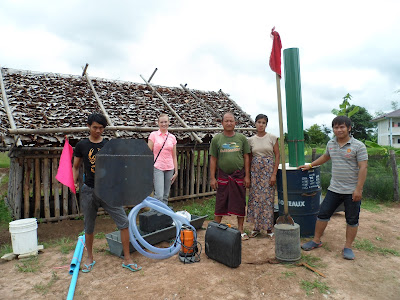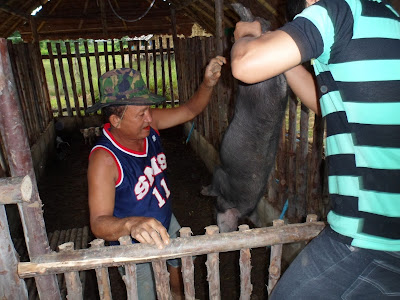 |
| Sai Aung (right) helping U Tin Yu pump out rain water from the pigpen. |
Sai Aung came to Thailand from Shan State Myanmar after Cyclone Nargis reaped great havoc on the country infrastructure in 2008. A little about Sai Aung in his own words:
"... Last year, I worked for the NGO Migrant Education as finance assistant. I checked all the receipts and gave feedback to the teachers because sometimes they gave us a delivery receipts and I had to ask them to change to Cash Sale Receipts. I checked all things including store stamp, signatures, etc..."
"...I had worked for Mae Sot Shipping before the Thai New Year in 2012. I delivered good lists and gate to gate passes from Thailand to Burma."
"...In 2009 summer holiday, I volunteered at Mae Tao Clinic at the library department. "
With Sai Aung on board, our team has been on the move. Check out our latest developments from our various projects
TPC Land and the Pig Project
- Last week we purchased a new water pump in order to drain flood water from the pigpens. Subsequently, we worked together to drain the remaining water in the pigpens employing the expertise of our carpenter/engineer friend, Mo Sas. See efforts below.
- Pigs were moved from the far end pen to the middle pen by Khom Loy Staff immediately after the pen was refilled with dry soil, rice husk, coconut husk and sprayed with EM fertilizer and salt according to the Korean-developed Natural Farming method that we follow.
- To account for the damages from the flood, we hired workers to re-dig drainage ditches and provide new, dry soil for the second pigpen.
- We employed the skills of Mo Sas to add a new circuit breaker to our TPC storage house in order to increase the safety of our power source.
 |
| Attaching a hose to our new water pump to drain out flood water from the pigpens. |
 |
| U Tin Yu placing the water pump in pen 2. |
 |
| Pen 3 damages before flood water was pumped out. |
 |
| Our team with our new gear--the newly made biochar apparatus, water pump, and pig feeding troughs. |
 |
| U Tin Yu and Sai Aung moving the pigs from one pen to another. |
 |
| Pigs enjoying their new dry pen! |
Banana Chopper Up and Running at TPC
After we completed a replication of our the old banana chopper used for Hwe Kha Lohke School pig project FBS (fermented banana stalk)-making, we brought the new chopper to our land at TPC. Until recently we did not have adequate time or labor to set it up. With time approaching to start integrating FBS into the pig feeding schedule, we solicited the help of Mo Sas once again.
Last Friday, our team spent several hours putting together the foundation for our banana chopper. Guidance and expertise from Mo Sas was integral in setting up the chopper correctly. See our efforts below! We plan to start making FBS next week with banana stalks supplied by a school partner. Keep posted for future updates.
 |
| Ko Lynn and Sai Aung moving the banana chopper. |
 |
| UPLift members putting together the banana chopper base. |
Financial Literacy Assessments have picked up again with Ko Lynn taking initiative to meet with various community groups (especially women's groups) in 3-4 potential communities to prepare our Financial Literacy Training Project in December-January. So far we have been given some community assessment information from Wide Horizon students on a few of our potential community project partners and Ko Lynn has visited each of the communities at least once. One of the potential communities is located on the premise of a factory that processes and distributes bulk agricultural produce and develops fertilizers/pesticides for large scale farming. Almost all of these Burmese migrant families (approximately 100 families) living on the premise were uprooted to Thailand in 2008 after Cyclone Nargis and as we have already noted in our assessments, the living conditions are squalid with minimal living resources and few opportunities for upward mobility. Some of the men are plagued by depression and drug/alcohol abuse. As we do not know much about the role of women yet, further assessments will allow us to determine if this community is the best fit for our upcoming Financial Literacy Project in 2014.
We also continue our exploration of Phase Two Financial Literacy: Small Business Development at the Cattle Yard--planning meetings to brainstorm income generation prospectives for the women's group.
School Garden Project Assessments
UPLift staff has begun school garden assessments to find 3-4 appropriate schools to partner with this dry/cool season for year 3 of our school garden projects. As we complete the assessments, we look at such things like square footage of the school, flooding issues, water sources, school food budget, student activities, teacher involvement, past/current garden-related projects, number of students, ages, whether or not students live/board on the school premise, and compatibility with the headmaster. Thus far, we have looked at two schools--one of which (called Irawaddy Flower Garden) we assessed last year but did not have an opportunity to work together. We have made an initial visit to Irawaddy and next we will complete a more formal assessment along with a day-long mock garden training to help determine the students/ teachers willingness to do the larger project.
The second school we've begin to assess is the professional training/community development school for older students called Wide Horizons--the same school we worked with on the Financial Literacy Project in the past and also where Ko Lynn received his training. Though Wide Horizon is not traditionally the kind of school we work with, we can clearly see the benefit of doing a garden project there as they are a trusted project partner and have expressed great enthusiasm for the project. The school setup, similar to TPC with students boarding/living at the school grounds throughout their entire matriculation, allows us to work with boarding student and teach them skills they can take with them when they complete their studies. As it is not our traditional school partner (we usually work with primary schools) the outcome of doing a project here will be a trickle-down effect since no doubt some of the Wide Horizon students will return to Burma and propagate all the skills they learned--including agricultural practices taught by UPLift. We look forward to moving ahead with Wide Horizons and assessing the project possibilities further.
That brings us up to speed for now. We'll be back with more updates soon!